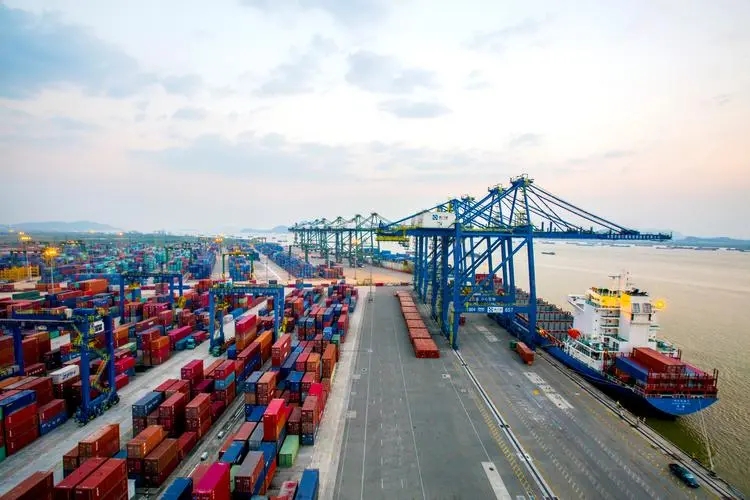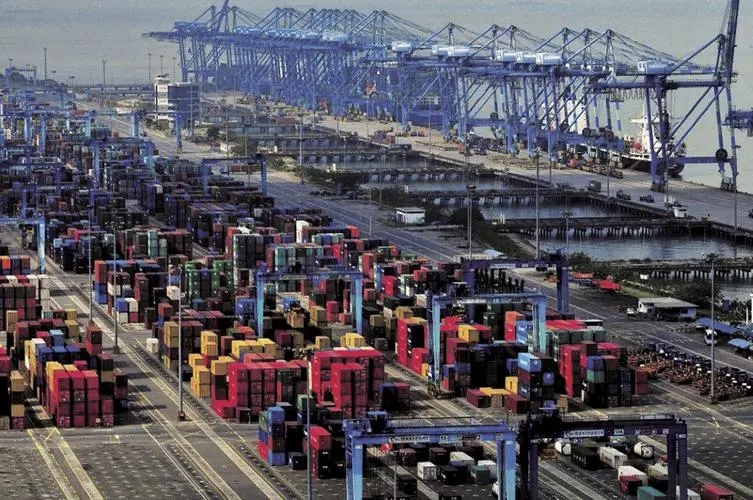"To get rich, we must first build ports" The "business" behind the construction
In June, COSCO Shipping Port acquisition of Germany's Hamburg Port "Fudi" container terminal 24.99% of the shares of the project completed delivery, a few months ago, the company also announced the investment in Egypt Sukona port new container terminal 25% stake. This is the epitome of Chinese enterprises accelerating overseas port investment and construction. Since the "Belt and Road" initiative was put forward in 2013, China's overseas port construction has accelerated significantly as an important link in infrastructure connectivity.
Ports are large-scale infrastructures connecting land and sea, and port projects are often characterized by large capital investment, long construction cycles, slow returns, and large uncertainties. Why has China stepped up its efforts to participate in and expand international cooperation on overseas ports over the past 10 years?
According to the "Strategic Analysis Report on China's Overseas Port Projects under the Belt and Road" published by the State Guan Think Tank in 2019, the impetus for Chinese enterprises to invest in ports along the Belt and Road stems from China's industrialization and modernization through opening up to the outside world, a development experience that provides strong confidence. The report concludes that Chinese enterprises' investment in ports along the "Belt and Road" is driven by the strong confidence provided by China's development experience of industrialization and modernization through opening up.
According to the report, the most fundamental motivation for Chinese companies to invest in ports overseas is to bring the Chinese experience to other developing countries, and to empower the economic development of the target countries through port construction and operation, which has yielded significant results over the past 10 years.

Wan Zhe, a professor at Beijing Normal University and a researcher at the Belt and Road Institute, said in an interview with China News Service that over the past 10 years, Chinese companies have actively participated in the construction and operation of ports in countries along the Belt and Road, which has not only vigorously contributed to the employment, infrastructure improvement and economic development of these countries, but has also benefited the countries with its excellent maritime services. This is mainly reflected in three aspects:
The first is to provide "China's program" of port-driven economy. For example, China Merchants Group, a Chinese port construction enterprise, has summarized the development model and experience of Shekou Industrial Zone and China's development zones, and formed the "Shekou Experience", that is, in the countries along the Belt and Road, with coastal ports as the characteristics, intermediate economic and trade cooperation zones as the platform for industrial aggregation, and backyard cities as the platform. In the countries along the "Belt and Road", the "integrated" strategic and comprehensive layout program of "front port, middle district and back city" is developed, with coastal ports as the special feature, middle economic and trade cooperation zone as the industrial aggregation platform, and back city as the support. Through cooperation with countries along the "Belt and Road", the company will develop overseas industrial parks in port areas, create a soft environment suitable for international production capacity cooperation, and at the same time help the host government to solve the problems of developing the economy and employment, and attracting foreign investment, etc., so as to make overseas industrial parks an important link between China and countries along the "Belt and Road". This will make overseas industrial parks an important bridge between China and the countries along the "Belt and Road".
Secondly, it strongly promotes local employment. Colombo Port City in Sri Lanka is a key cooperation project of "Belt and Road" and the first "Special Economic Zone" developed and operated by Chinese enterprises overseas, which is invested, constructed and operated by China Harbor under CCCC Group, and has been selected by Forbes Magazine as one of the "Five Influential Projects of the Future". It is also the first "special economic zone" developed and operated by a Chinese company overseas, and is invested and operated by China Harbor, a subsidiary of CCCC Group. According to the assessment of management consulting firm PricewaterhouseCoopers, the Colombo Port City project will attract more than 9.7 billion U.S. dollars in foreign direct investment for Sri Lanka in three phases: primary development, secondary development and urban operations. The project will add more than US$5 billion to the Sri Lankan government's coffers and will continue to create a total of more than 400,000 quality jobs for the local community.
Third, to promote the high-quality development of ports with smart ports. Haifa New Port is the first new terminal in Israel in 60 years, and it is also the first time for Chinese enterprises to export advanced technology and management experience of "smart port" to developed countries. Haifa New Port is one of the most advanced ports in the world, which will greatly change the congestion of local ports, provide more efficient and convenient services for the circulation of goods in Israel and neighboring regions, and promote Shanghai Port to strengthen business ties with ports along the "Maritime Silk Road" and build an important trade channel to and from the European market.

At the end of 2022, Shanghai Jiao Tong University Press published the book "China's Participation in the Construction of Ports in Countries Along the Maritime Silk Road", which also suggested that China's participation in the port construction practice along the Maritime Silk Road has promoted the emergence of international port cooperation. The participation of Chinese enterprises in global port construction is a commercial behavior based on the principle of competition in the international market, rather than a strategic behavior to expand maritime power and geopolitical interests; the pursuit of inclusive geo-economic interests, rather than exclusive geopolitical interests.
In response to the recent U.S. so-called national security threat to render the so-called "China's investment in global ports threat theory", Wan Zhe believes that this is the normal infrastructure construction cooperation pan-politicization, pan-ideologization, pan-security, which is the U.S. on their own infrastructure construction capacity of "anxiety This is the "anxiety" of the U.S. about its own infrastructure construction ability, which is essentially the "defense" of the U.S. inability to provide the world with public goods and economic recovery.